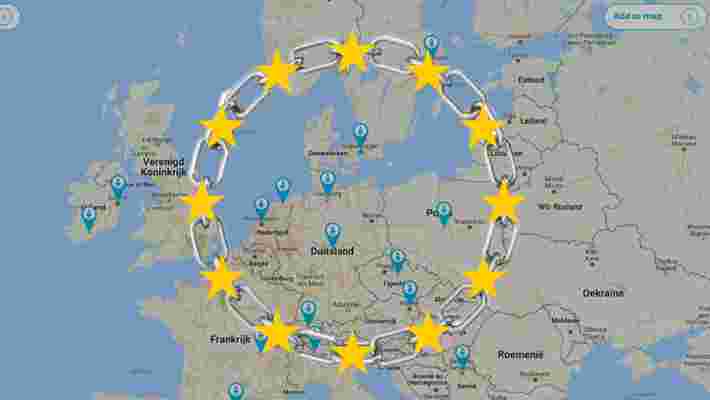The first piece of blockchain-related tech from Telegram was shown off last week, but experts are claiming that its just waiting to be hacked.

Telegram Passport is meant to be a secure way of managing identity documents. It pegs itself as being able to provide a “unified authorization method” that makes supplying services (like ICOs and exchanges) with real world IDs more straightforward.
But there’s a massive spanner in the works: researchers say they have found Telegram Passport to be completely vulnerable to brute force attacks. Software security firm Virgil Security have released analysis, spotted by CoinDesk , that claims certain design choices could compromise users’ passwords.
One of those choices is to use the SHA-512 algorithm to hash (encrypt) password data. As this algorithm was not designed for use with passwords, the research claims, cracking any stolen hashed passwords almost makes economic sense.
Such disregard for security practices led to a combined 58 million passwords stolen from LivingSocial and LinkedIn a few years ago. “In the case of LinkedIn, 90 percent of the hashed passwords were reversed within a week,” the report highlights.
While Telegram Passport hasn’t been formally recognized as part of its rumored billion dollar private ICO, identification management was included in Telegram’s leaked white paper .
It’s official announcement does make reference to cryptocurrencies. It should also be noted Telegram have made the APIs that power its Passport service open source, enabling such public analysis.
Regardless, if Telegram want to establish itself in the cryptocurrency market, it had better up its game. You would think, too, with its eyes on blockchains, that it would have at least mastered hashing – perhaps LinkedIn can give it a tutorial.
EU’s interactive map lets you explore the local cryptocurrency startup scene
Have you ever wanted explore the cryptocurrency scene in Europe? The EU Blockchain Observatory and Forum has built a nifty interactive map that lets you scout the European crypto-ecosystem for relevant startups and events.

The tool makes it pretty easy to discover blockchain companies and events. When clicked, each entry on the map displays further information about the company or event in question, including how it was founded, what it does, and what its website is. One particularly useful feature is that the map lets you filter the search criteria for more efficient results.
While the map was built with Europe in focus, the Observatory says that users are more than welcome to add companies from other continents to the map. As of now though, there are no entries outside of Europe.
It is worth keeping in mind that all information that appears on the map is crowdsourced. The Observatory notes it reviews all submissions before putting them up on the map, but it might be a good idea to do your own research on any companies and events you find interesting. The map is more of a discovery tool than a reliable source of information.
EU Blockchain first announced the initiative in March, which would explain why there aren’t all that many entries on the map so far. But hopefully things will change in the future.
Anyone interested in contributing to the map can propose companies for consideration by using this form . There is also a separate form for event submissions.
In other news, next week the Blockchain Observatory will also be hosting an ‘Ask me Anything’ session to answer your questions about the future of the technology. Find out how you can participate in this session here .
The curious case of the 1,600 Bitcoin ATMs Argentina might never see
Contrary to what was promised, Argentina might not be getting thousands of Bitcoin ATMs (BATMs) by the end of 2019 after all.

Back in October, Reuters reported US-based financial solutions provider Odyssey Group was gunning to roll out 150 Bitcoin-enabled ATMs in Argentina by the end of 2018, with plans to distribute over a thousand more machines by 2019.
Indeed, Odyssey general manager B egona Perez De Solay ambitiously stated to Reuters the company aims to have installed a total of 1,600 Bitcoin ATMs by the end of 2019, with plans to expand in other Latin American countries in the near future.
The number might appear underwhelming to cryptocurrency outsiders, but in reality it was a big deal. At the time, there were less than 4,000 Bitcoin cash points around the world. Odyssey’s move alone would’ve expanded this effort by almost 50 percent.
Factoring in Argentina’s prolonged economic struggles and the dwindling value of the peso, Bitcoin was swiftly bandied about as the ultimate tool against inflation (though many researchers disagree with this characterization ). For context, Reuters noted the peso had lost over 50 percent of its value against the dollar in 2018 as of October.
The only missing part of the puzzle were cryptocurrency-enabled ATMs – and Odyssey was determined to fill this gap.
Everything seemed to suggest Odyssey had arrived in the right place at the right time.
But a month and a half later, Odyssey is backtracking its promises and instead setting its sights on a new launch. “ The expected start date of the ATMs in Argentina was postponed,” CEO Sebastian Ponceliz admitted in an email to Hard Fork.
While the sudden delay might be nothing new in the world of blockchain, Odyssey has an extensive record of failing to deliver on its promises.
Years of empty promises
Although the most recent, this was hardly the first time Odyssey had promised to bring its Bitcoin-enabled cash points to Argentina.
In September, 2017, Ponceliz told reporters that Odyssey subsidiary, Octagon, would be installing 250 BATMs in Buenos Aires starting from October. Among other things, he said the machines would support various fiat currencies and cryptocurrencies, including Bitcoin, Ethereum, and Litecoin. He further added there were plans to add even more coins.
In May, 2018, Odyssey went on another media run. Ponceliz told numerous outlets that Odyssey had reached an agreement with the Central Bank of the Argentine Republic (CBAR) to install 4,000 Bitcoin cash points – in his words, only a small part of the 30,000 ATMs the bank intended to roll out.
In the same interview, Ponceliz also said his company had already mounted 200 BATMs in the country in 2017. But a couple of months later in October, Odyssey had changed its tune yet again.
At the time of writing, it seems the company has not yet started installing its cryptocurrency-powered cash points. “[Odyssey] said of the 150 ATMs it aims to install by the end of the year in Argentina, 80 percent of those will be bitcoin-operational within the first months of 2019,” Reuters wrote in October.
To reiterate, Ponceliz said Odyssey had already installed 200 BATMs in Agentina in May. Months later in October, another Odyssey spokesperson claimed the company has yet to start rolling out its first 150 cash points in the country.
Not only that: Odyssey had also abandoned its bombastic goal of installing 4,000 BATMs and adjusted the number to a slightly more humble 1,600.
According cryptocurrency ATM mapping service CoinATMRadar, there are currently only three Bitcoin-enabled ATMs in Argentina. None of those were installed by Odyssey or its subsidiary Octagon; instead, they were handled by another ATM technology provider known as Athena Bitcoin.
Asked about the accuracy of its map, CoinATMRadar explained to Hard Fork that while its map is not 100 percent accurate for various reasons, the company believes it has “the most up-to-date” data.
“ We collect information from various places,” CoinATMRadar told Hard Fork, “[including] operators submitting information themselves, information from public sources, and other [crowdsourced submissions].”
For whatever reason though, Odyssey and Octagon were oddly absent from CoinATMRadar.
Yet another delay
Shortly after Reuters’ coverage, Odyssey immediately made headlines with its ambitious plans to bring 150 Bitcoin cash points in Argentina by the end of 2018, and a total of 1,600 units by 2019.
Hard Fork ultimately reported on the story too, noting that Odyssey had previously made similar claims – without any evidence to suggest the company had delivered on its promises.
We reached out to Odyssey and Ponceliz to ask about the string of inconsistencies in their previous statements.
After a month of follow-up emails and numerous unsuccessful attempts to reach Odyssey representatives over the phone, Ponceliz eventually told Hard Fork the BATM rollout has been delayed – but not without making yet another boastful excuse.
“ Odyssey group has introduced a revolutionary change in Argentina, not only regulatory, but also technological. This has involved coordinating the joint work of numerous government entities and business organizations,” Ponceliz told Hard Fork.
“The expected start date of the hybrid ATMs in Argentina was postponed with the purpose of adjusting all the legal and technical requirements demanded by the Central Bank of the Argentine Republic and the financial and system partners of the local market,” he continued.
( We’ve asked Pocneliz to elaborate further on Odyssey’s collaboration with the BCAR. We also reached out to BCAR with the same question. Neither of those two parties were available for comment by the time of writing.)
“ Because Odyssey Group understands that the speed of reaching the market is as important as the highest quality in all the processes that it offer, it takes all safety precautions,” Ponceliz added. “ Finally, we estimate the definitive enter into the market during the next six months.”
The Odyssey CEO did not mention how long it would take to hit his target of 1,600 ATMs (or if we go by his past claims, 4,000). For context, CoinATMRadar indicates the total amount of Bitcoin cash points around the world stands at 4,020 at present.
For all those lofty ambitions, Odyssey has not posted any information about its cryptocurrency-powered ATM technology on its website. In fact, there is not a single mention of Bitcoin or cryptocurrency (or its subsidiary Octagon) on its website. We asked Odyssey about why that might be, but the company didn’t answer.
(We’ve asked again and will update this piece accordingly if we get a legitimate response.)
With all the regulatory uncertainty in the blockchain and cryptocurrency space, there is no doubt that deploying such a large network of ATMs – be they cryptocurrency-enabled or not – is no easy task. The numerous delays are not the problem here – the problem is Ponceliz’s pattern of making misleading promises.
So is Argentina getting hundreds of Bitcoin ATMs in 2019? Maybe. But if history is any indication, it takes more than pompous promises to breed real results.
Additional reporting by Matthew Beedham











